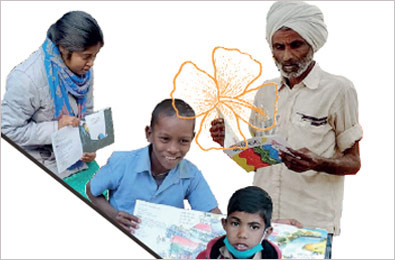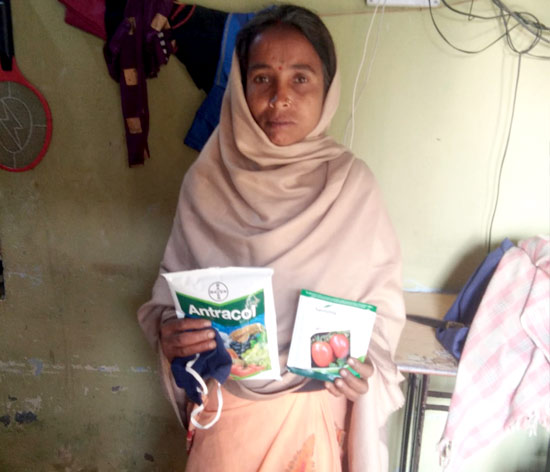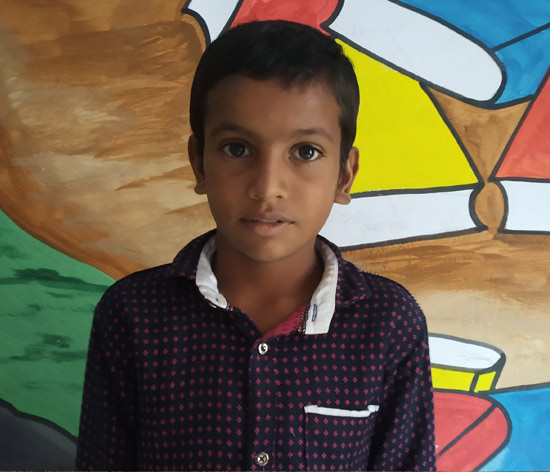Disaster Relief and Rehabilitation
One Against Covid
About the theme
When the global health crisis made it way in India in 2020, the Trusts responded immediately, committing Rs5 billion towards Covid relief initiatives. With the pandemic putting stress on the country’s health ecosystem and the shortfall in equipment needed to fight an infectious outbreak, it was imperative that relief measures address these and other critical lacunae.
‘One Against Covid’ is the Trusts’ country-wide initiative to assist administrations and citizens
In an urgent need to deal with an unprecedented health crisis that’s over-burdening the nation’s health-care system, leaving millions at risk of exposure and adding to the vulnerabilities of India’s frontline workers, the Trusts are leveraging technology, funds and manpower to raise awareness, provide training and equipment to healthcare professionals, provide personal protective equipment (PPED) such as face masks and shields, gloves and protective gowns to health workers across the country, offer health care to a suffering populace, screening and providing cancer care facilities closer to home, and screening for reducing the plight of the migrant populace by facilitating linkage with the social welfare schemes.
Alongside, the Trusts are working to supplement their ongoing Elder Care programme by addressing the effects of the pandemic on the elderly. Social distancing has only increased their isolation and loneliness, exacerbating conditions like anxiety and fear, etc. This aggravates their overall health and mental well-being. The Trusts are actively engaged in providing continued support to the elderly by moving the engagement to digital and electronic spheres.
One of the biggest issues during a pandemic is the lack of accurate information. The Trusts took the lead and planned a country-wide health campaign to raise awareness of Covid safety measures especially for the rural communities
Work is already underway in the following key focus areas:
- Procurement
- Personal protection equipment for medical personnel on the frontlines
- Testing kits to increase per capita testing
- Creation of modular facilities for healthcare to improve availability of Covid care facilities
- Enhancing the capacity of healthcare professionals to respond to the crisis
- Community outreach programme aimed at building knowledge and increasing the resilience of our communities
Latest
The Response of International Philanthropic Organisations to the COVID-19 Pandemic (2020–2022)
View more themes
...Continued
Nepal earthquake – relief and rehabilitation
...Continued
Uttarakhand flash flood relief
Flash floods and landslides set off by extreme rainfall over a period of several days in Uttarakhand in June 2013, led to unprecedented damage and destruction in the state. Post the initial relief and recovery stage, Himmotthan Society — the Tata Trusts’ associate organisation in the region — initiated a set of post-disaster initiatives, with support from the Tata Sustainability Group, the Tata Trusts and Star India Pvt Ltd.
Rehabilitation effort: The intent was to restore the livelihoods of 9,049 disaster affected households in 95 villages of Rudraprayag, Uttarkashi, Chamoli and Pithoragarh districts of Uttarakhand. The focus of the programme was on building on-farm as well as off-farm activities to improve the quality of life of impacted and vulnerable communities. The programme worked to enhance the income of small and marginal families, and strengthen producer (community) based institutions to manage micro-enterprises in a sustainable manner.
Highlights of the rehabilitation operation:
- 392 self-help groups, 74 village organisations (3,982 members) and 7 self-reliant cooperatives formed; federation-led enterprises established in all clusters.
- 7 federation-led micro-dairies established with a total turnover of Rs3.1 million. Fodder plantation undertaken on 290 hectares of common and private land.
- Over 2316 families cultivated vegetables and spices on 290 hectares and market vegetable and spices 7 clusters.
- 108 off farm income generation activities carried out, supporting 135 distressed families with average monthly income of Rs2,500 for each family.
- Five animal feed and agri processing units established with support of the village panchayat.
- Over Rs5.2 million dovetailed from different government departments/schemes; community contributed Rs2.2 million in cash and kind.
...Continued
Odisha Fani cyclone
A powerful cyclonic storm named Fani hit the coast of Puri district, Odisha on 3rd of May 2019 at around 8.30a.m. It generated storms with wind speeds ranging 200-210kmph and caused widespread damage in Odisha. While Puri district bore the brunt of the calamity, the cyclone affected a total of 14 districts and impacted a population of 1,50,93,513 persons. Though the government of Odisha was able to evacuate over 1.4 million persons into cyclone shelters in time, there was reported casualty of 64 persons and extensive damage to houses, electricity supply, water supply and telecommunication infrastructure.
Responding swiftly to this disaster, the Tata Trusts’ team made a quick assessment of some of the worst-affected areas in Puri and Khurda districts, where cooked food and clean drinking water emerged as the immediate needs of the cyclone-affected population. The cumulative intelligence of some of the recent disaster responses by the Trusts in Kerala, Karnataka and Jammu and Kashmir shaped the operational strategy and delivery on the ground. With their experience and expertise in RO water intervention, the Trusts decided to supply pure RO drinking water in these districts on a war footing.
Within 2 days of the cyclone, the Trusts initiated their water intervention from Bhubaneswar, and subsequently from Puri, with three mobile RO units supported by Tata Projects. Livolink Foundation a Tata Trusts’ associate organisation in Odisha, deployed a strong field team to manage ground operations. The identification of slums and rural pockets was done in collaboration with the Department of Housing and Urban Development, District Administration of Puri; Centre for Youth and Social Development (CYSD), a local NGO; and other partner organisations.
Tata Motors provided three water tankers, with a capacity of 2000 litres each, to further strengthen the distribution process and make delivery accessible to interior pockets. The RO water intervention, through 5 -16 May 2019, covered 63 villages in Puri and 33 slums in Bhubaneswar, with more than 1, 15,000 litres of pure drinking water supplied to the neediest.
...Continued
Kerala flood relief
The catastrophic floods in August 2018 caused massive destruction in the state of Kerala, fondly called ‘God’s own country’. Causing immense loss of life and property, this is possibly the biggest tragedy that the state has faced in the recent times. Though all 14 districts of the state bore the brunt of the disaster, Wayanad and Idukki in particular were the most adversely affected. The floods, along with severe landslides in these hilly terrains, led to people losing their houses as well as land. The Tata Group and the Trusts under the leadership of Tata Sustainability Group, deployed full-fledged teams to provide relief and rehabilitation across the affected areas of Kerala.
Key Achievements
- Mobilising three mobile Reverse Osmosis units from Hyderabad and deploying them in flood-hit areas of Kerala, in association with Tata Projects Community Development Trust, Titan and other civil society organisations.
- Supplying over 200,000 litres of safe drinking water to approximately 6,500 households across the rural areas of Kochi, Alleppey, Wayanad and Idukki districts between August 19 and September 5, 2018.
- Operationalising two “Water from Air” units with support from Israel-based WaterGen Technologies, to supply safe drinking water to more than 200 households a day. These units provided water till the end of October, 2018.
- Working with volunteers from the Tata Group and the Department of Health, Government of Kerala to provide medical support and conduct medical camps and home visits in Wayanad and Idukki districts, directly benefitting a total of 1,233 individuals.
- Administering appropriate medication to prevent outbreak of diseases such as leptospirosis.
...Continued
South Rajasthan flood relief
A brief period of two weeks during July and August 2017 saw unprecedented rains lashing Rajasthan, India’s largest state. Normally characterised by a hot and arid climate, the Sirohi, Pali and Udaipur districts of south Rajasthan received 800mm to 1,200mm of rain, and was soon inundated in massive floods. The deluge not only caused loss to life, property and cattle, but also burst key junctions of the Narmada canal. Roads, livestock and crops were washed away.
With support from Tata group companies, the Tata Trusts, along with their associate organisation Centre for Microfinance (CmF) Jaipur, initiated immediate relief operations involving the relocation of people to safer places and the provision of basic necessities.
Highlights of the relief operations:
- A total of 14,824 households were provided minimum 5 days’ stock of chlorine tablets to disinfect water against bacteriological contamination.
- As a precautionary measure, 3,500 packets of oral rehydration salts (ORS) and 2,542 mosquito repellent coils were distributed amongst the affected people to tackle diarrheal and malarial diseases.
- A mobile reverse osmosis (RO) water unit was installed in the Abu Road block, through which over 140,000 litres of treated water were supplied to 10,423 households in Abu Road and the Reodar block.
- In all, 12,326 bars of soap, 20,427 biscuit packets and 12,337 sanitary napkins were provided to direct beneficiaries through anganwadis and local community resource personnel.
- The Trusts supplied 296 plastic tarpaulin sheets to those whose houses were damaged, and distributed 445 food packets to select households that had lost connectivity.
- Totally, 600 blankets were provided on request from the district administration and 500 raincoats were provided to the field staff, accredited social health activists (ASHA), auxiliary nurse midwives (ANM), and anganwadi workers.
- A total of 4,160 patients suffering from post-rain scabies, diarrheal diseases, fever, etc, were treated at 33 health camps that were set-up to contain the outbreak and spread of diseases.
The relief activities were operational during July 30 to August 31, 2017.
...Continued
North Gujarat flood relief
The same spell of rain and floods that affected Rajasthan in 2017 also devastated parts of Gujarat. Rains in Banaskantha and Patan districts led to flooding in the Banas river. This added to the heavy inflow of flood water from the adjoining districts of South Rajasthan.
Officials of Tata Trusts and Tata Chemicals visited the flood-affected districts and met the District Collector in charge of coordinating flood relief operations. Consequently, a decision was taken to focus relief operations in 23 villages of the Tharad block of Banaskantha district. A mobile RO unit was immediately deployed to help supply clean drinking water. On request of the state authorities, the relief operations were extended to the flood-affected villages in the neighbouring Patan district, including the Santalpur block.
In alignment with the approach of having a 'One Tata Response' to the flood relief operations, the Gujarat State Level Disaster Response Forum was activated, and efforts were coordinated at the group level. A core coordination committee with representation from Tata Chemicals, Tata Consultancy Services (TCS), Tata Sustainability Group (TSG) and Tata Trusts was formed to oversee the relief operations. Mobilisation of volunteers across the group companies and that of additional resources was undertaken. One team operated out of Tharad, while the other was located out of the Radhanpur block in Patan district, coordinating the relief operations in the Santalpur block, which had no facilities as yet.
The relief operations from July 29th to August 30th, 2017, covered 3,500 households across 23 villages in the Tharad block, and another 1,500 households across 27 villages in the Santalpur block.
Highlights of the relief operations:
- Health check-ups were undertaken and medical assistance provided to 2,121 patients suffering from skin infections, myalgia and diarrhoea across the targeted villages.
- Over 420,000 litres of clean drinking water were supplied.
- Veterinary camps were held and over 4,000 heads of cattle vaccinated.
- Kitchen kits and hygiene kits were distributed to 3,100 households.
- Kits comprising large-sized storage and cooking vessels, pressure cookers, grain and other food materials, storage boxes, plates and cups for serving food to children, Tata Swach water purifiers, etc, were distributed to 30 anganwadis situated in flood-affected areas.
- School bags were distributed amongst 1,000 children.
- Measures were undertaken to ensure safe disposal of animal carcasses; over 1,000 carcasses were efficiently disposed.
...Continued
Tamil Nadu flood relief
Tamil Nadu Flood Relief
Heavy rains during November and the first week of December 2015 caused widespread flooding and damage in Tamil Nadu, with Chennai city, Cuddalore, Kanchipuram, and Tiruvallur districts being the worst affected. It is estimated that more than 350 people lost their lives and around 10,000 were displaced. The central government declared Chennai a National Disaster Zone.
As part of an immediate response, a four-member team from Tata Trusts visited the flood-affected regions to assess the ground situation; it was decided to support the victims through provision of safe drinking water.
Highlights of the relief operations:
- A total of 15 areas across Chennai were identified and over 100,000 households were supplied purified drinking water over a period of nine days with the help of a Reverse Osmosis plant that was set up.
- In parts of north Chennai, residents were supplied with 1,200 jerry cans to tide over the problem of water storage.
- A resource network was established with the local bodies - especially with the District Administration and key voluntary organisations - resulting in regular on-field information, thereby facilitating quicker response.
Click here to view the film on Tata Trusts' relief measures for Chennai flood victims
View all initiatives under this theme
...Continued
Tata Trusts Health Advisories
Practicing COVID appropriate behaviour, including vaccination, is very important to help us tide over this challenging time.
...Continued
Supporting the elderlies
...Continued
Flattening the Covid-19 curve, the Nagpur way
...Continued
Tata Trusts joins the Telangana government’s battle against Covid
...Continued
Making communities aware of safe behaviours
Right knowledge is the first step in building resilience amongst our communities. Recognising this, Tata Trusts have begun a pan-India community outreach to induce adoption of health practices in rural areas to prevent the spread of Covid. The exercise is expected to have reached about 12 million people in 21 states.
This communications effort encourages healthy practices such as hand hygiene, social distancing, breathing etiquette, along with identifying early signs of the disease. A campaign called ‘5 kadam, Corona Muktjeevan’ (5 steps for safety) has been created to motivate communities to adopt safer behaviours.
The campaign has developed 300 audio files and videos in several languages, including Assamese, Garhwali, Dongri, Kumaoni, Ladakhi, Garhwali, Santhali, Mundari, Kutchi (Gujarat) and Koborok (Tripura). Over 70 celebrities have stepped up to participate in the campaign including Nana Patekar and Sonali Kulkarni in Marathi, Parthasarthy in Telegu and Malini Awasthi in Hindi. (The video playlist is available for deployment by any organisation and can be viewed here.)
Over 430 master trainers from Tata Trusts regional teams have been trained to take this campaign further. These trainers have trained 8,700 community resource persons in 21 states. Currently, this network has reached out to 8,000 villages.
Platforms like Gram Vaani and TCS mKrishi have been used to start the initiative via voice and SMS in Punjab, Maharashtra, Uttarakhand, Uttar Pradesh and Telangana covering 440,000 households to date. This will be scaled up ten-fold in the coming days.
...Continued
Procurement of PPE
Tata Trusts have procured tonnes of PPE for the safety of frontline healthcare workers. The material — coveralls, gloves, N95 and K95 masks — has landed in India and will be distributed among hospitals in over 20 states shortly. The Trusts sourced the material from FDA-approved suppliers in China. The Tata ecosystem stepped up to support the effort: Tata International provided import and customs expertise, Voltas provided a 100,000 sq ft warehouse in Pune and Trent is overseeing warehouse management.
...Continued
Strengthening community outreach
In Madhya Pradesh, 16 members of the NCD screening team have been trained to support the 104 and 181 health helplines. The team has fielded 1,300 calls, pacified anxieties, counselled people under quarantine and guided ill patients to the nearest health facilities.
The Elder Spring senior citizen helpline in Telangana is counselling senior citizens, helping over 100 senior citizens in need get deliveries of groceries and medicines, and ensuring requests for groceries and essential items at 56 old age homes across the state are passed on to the government.
In Nagpur, Maharashtra, the Model Urban Primary Health Center programme has quickly taken on the responsibility for Covid response. More than 330 frontline workers have been trained who have cascaded the training to over 2,000 workers. The response centre has handled over 1,800 calls and screened 500,000 people as per the community based process.
The Tata Trusts along with committed local and global partners as well as the government to fight this crisis on a united public health collaboration platform which will strive to reach out to sections that are underprivileged and deprived.
*Figures on this page were updated on 16 April 2020.
See more on our Disaster Relief and Rehabilitation work.
...Continued
Empowering students and teachers in the pandemic
Providing students with free access to high-quality learning materials in their preferred language



